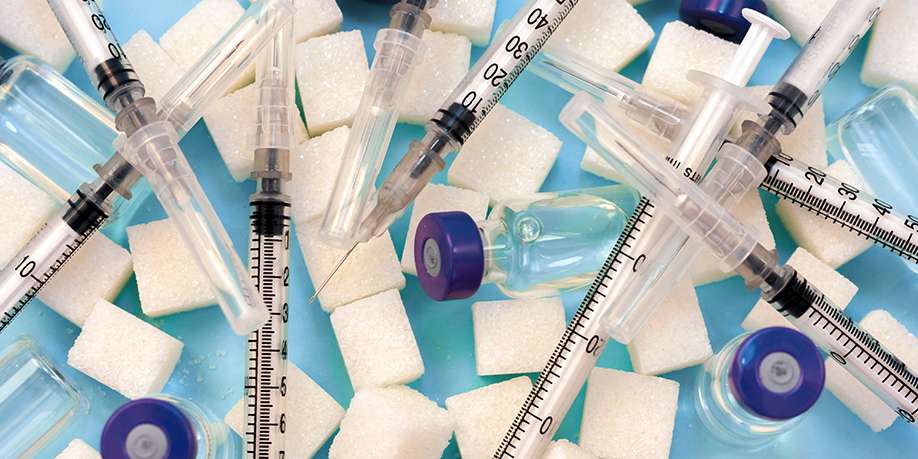
Does "Insulin" or "Insulin Pump" Cause Weight Gain?Does "Insulin" or "Insulin Pump" Cause Weight Gain?
  © Inuella365 | Dreamstime.com Although there is no ultimate cure for diabetes yet, people have learned to successfully keep the disease at bay for decades. We now have medical resources that allow people with diabetes manage their condition and live full normal life. The progress of science doesn’t stop and new treatments keep emerging on the market, but currently, if you suffer from high blood sugar levels because of Type-1 or Type-2 diabetes, insulin is still the most powerful and effective treatment in the world today. To put it simple, if you have Type-1 diabetes, you need insulin to survive and the condition of millions of people with Type-2 diabetes requires insulin injections to manage their blood sugar levels. Since January 11, 1922, when insulin was first used as a treatment for diabetes, it has saved lives of millions of people, who otherwise wouldn’t survive through childhood. Since then, many scientific and technological advancements have been made, such as insulin pump in 1974 (when it was first introduced, it bore the name “Biostator”) or insulin pen that appeared in 1985 (named the NovoPen). It provided more convenient insulin delivery than syringes. However, despite being a savior of so many people’s lives and all advancements that have been made, insulin is not without flaws. Among the most common ones is that insulin has a tendency of causing weight gain. So why is it happening and can the gain weight problem be addressed? When diabetes is not properly managed, blood sugar level rises way above normal. It happens because your body cells are unable to absorb glucose that they need for energy. To absorb glucose, your body cells need insulin, which the body either doesn’t produce enough (Type-1 diabetes) or unable to utilize (Type-2 diabetes). When too much sugar gets accumulated in the blood, your body tries to discard this sugar through urine. – That’s why frequent urination is one of the most common signs of uncontrolled diabetes. It takes water to produce urine. So your body, in attempt to get rid of excessive sugar, loses too much water, which causes weight loss. This weight loss is unhealthy and you end up losing way more weight than you should and normally would, taking into account your usual food consumption and lifestyle. Another common sign of diabetes is increased hunger and consequently, you start eating more. But even if you consume more calories than you burn, you may still keep losing weight due to excessive urination. Once you start insulin therapy, your blood sugar returns to normal level as the glucose begins to get absorbed and stored in your body cells. Frequent urination stops since there is no more need to get rid of extra sugar, which mean you stop losing more water than you should and as a result, you gain weight. This gain, though, is not a bad thing. – Your body is just getting its weight up to normal. Nevertheless, the human body works the way that its cells either use the absorbed glucose for energy or transform it into fat for long-term storage. So, if your body gets more glucose than it naturally needs for energy, the extra glucose gets converted into fat, which causes extra weight gain. Now, you goal comes down to completing a single objective that can be not so easy to complete: to achieve and maintain the balance between the normal blood sugar level and body weight. Fortunately, there are effective ways to do it. Refine your diet. Nutrition plays a vital role in managing diabetes. Your meals should contain a well-balanced combination of proteins, fats, fruits, and both starchy and non-starchy vegetables. You should also monitor your calories intake to make sure that the amount of calories you consume is in balance with the lifestyle you have. Avoid skipping meals. Watching calories doesn’t mean skipping meals, though. It can cause you more harm than good. Skipping meals can lead to hypoglycemia – a potentially dangerous low blood sugar condition. Besides, skipping meals can make you too hungry, which can cause you make poor meal choices, eat more than you should, and consequently, gain weight instead of losing it. Pack your day with physical activities. There is one great thing about physical activities – they burn calories. Plan and simple. Permanently integrate physical activities into your life. Exercise may improve insulin sensitivity, which may help you reduce your insulin dose and lose weight as well. Beware of hypoglycemia. High blood sugar is bad, but low blood sugar (also called hypoglycemia) is not a healthy thing either. In fact, it can be quite dangerous. Hypoglycemia symptoms include fatigue, anxiety, hunger, sweating, and in severe cases confusion, seizures, and loss of consciousness. If you experience low blood sugar, that means you might be taking a higher dose of insulin than you should, which may promote the buildup of fat and lead to unwanted weight gain. Minimize insulin consumption. Adjust your diet and lifestyle to reduce your insulin consumption as much as possible. Minimize amount of carbohydrates in your diet and maximize exercising. – This combination will help you reduce your daily dose of insulin and as a result, lose weight. Take medications responsibly. Do not experiment with the drugs you’ve been prescribed. – Do not skip insulin doses, but do not overload yourself with insulin either. If you use an insulin pump, make sure that it’s setup properly and doesn’t dispense more or less insulin than it should do. Consult with your healthcare team to determine what additional medications might work for you. Many people take additional diabetes medications along with their insulin to improve insulin sensitivity, enhance the body’s own insulin production after having a meal, and by that reduce daily insulin doses along with the risk of weight gain.
| |||||||||||||||||||||||||




























